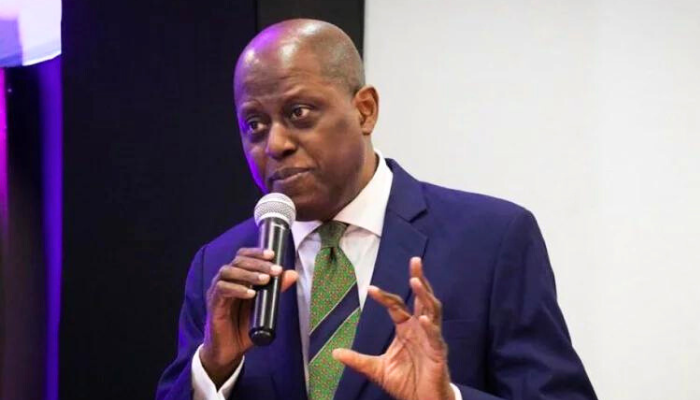By Isah Aliyu Chiroma
The appointment of Yemi Cardoso as Governor of the Central Bank of Nigeria (CBN) a year ago marked a turning point in Nigeria’s economic journey. Faced with significant economic challenges—rising inflation, exchange rate volatility, and weaknesses in the financial sector—Cardoso embarked on a mission to stabilize the economy and promote growth. His leadership has been defined by a series of bold reforms aimed at bringing stability, fostering economic inclusiveness, and laying the groundwork for long-term prosperity.
Cardoso’s entry into office came at a time of great economic uncertainty. The Nigerian economy was grappling with the twin challenges of inflation and a volatile foreign exchange market. Recognizing these issues, the CBN under Cardoso initiated several key reforms aimed at fostering stability, strengthening regulation, and promoting transparency. This approach reflects Cardoso’s commitment to steering Nigeria’s financial sector toward a more sustainable and inclusive future.
One of the major accomplishments under Cardoso’s leadership has been the overhaul of the regulatory framework governing financial institutions. Recognizing the critical role banks play in economic stability, the CBN embarked on a comprehensive recapitalization of banks, ensuring that they remain adequately capitalized to weather economic shocks. The new directive announced in November 2023, which mandates banks to meet updated capital thresholds by 2026, is a forward-looking move that will increase resilience within the financial system.
Furthermore, the CBN has streamlined the process of bank licensing and expansion, leading to the approval of several new banks, including microfinance institutions that cater to underserved segments of the population. The issuance of licenses for regional non-interest banks is particularly noteworthy, as it marks a significant step toward increasing financial inclusion and providing more diverse financial services to a broader spectrum of Nigerians. The expansion of the microfinance sector with 16 new banks and the re-licensing of 53 others is expected to boost access to credit for small and medium-sized enterprises (SMEs) across the country, promoting entrepreneurship and job creation.
The regulatory review of Bureau de Change (BDC) operations is another initiative aimed at promoting transparency in the foreign exchange (FX) market. The new licensing requirements and capital standards imposed on BDCs are designed to enhance oversight and distribution of foreign currency, ultimately reducing market distortions and ensuring a more stable FX market.
A defining feature of Cardoso’s tenure has been his focus on consumer protection and ensuring that the rights of Nigerians in the financial sector are safeguarded. The CBN’s introduction of a risk-based approach to consumer protection is a clear reflection of its proactive stance. By identifying risks early, the CBN is better equipped to close policy gaps and protect consumers from exploitative practices. The rigorous enforcement of sanctions against financial institutions that breach regulations underscore the CBN’s resolve to promote transparency and accountability.
In addition, the CBN has been instrumental in the resolution of nearly 20,000 consumer complaints in just eight months, facilitating refunds totaling over N7 billion. This not only highlights the effectiveness of the CBN’s regulatory mechanisms but also builds trust in Nigeria’s financial institutions, a crucial factor in encouraging financial participation and inclusion.
Cardoso’s administration has also prioritized digital transformation, recognizing its critical role in modernizing the financial sector. The introduction of the Unified Complaints Tracking System (UCTS) and the development of USSD codes for verifying licensed institutions have significantly improved service delivery and consumer experience. These digital tools make it easier for consumers to access information and resolve issues in real time, fostering greater confidence in the system.
The launch of the Women Entrepreneurs Finance Initiative (We-FI) code in mid-2024 is another significant achievement, aimed at reducing the gender gap in financial inclusion. By focusing on improving access to financial services for women-owned micro, small, and medium-sized enterprises (MSMEs), the CBN is contributing to a more inclusive and equitable financial landscape.
With the growing prominence of digital financial services, the CBN under Cardoso has also placed a strong emphasis on cybersecurity. The adoption of ISO 27001 standards and the introduction of a risk-based cybersecurity framework are vital steps toward ensuring that Nigeria’s financial system is resilient in the face of cyber threats. As digital transactions increase, the need for robust cybersecurity measures becomes more critical, and the CBN has taken commendable strides in this regard.
Furthermore, the CBN has revised its anti-money laundering and counter-financing of terrorism (AML/CFT) guidelines to adapt to the evolving digital asset landscape. By including Virtual Assets Service Providers (VASPs) in its regulatory framework, the CBN is ensuring that the rise of fintech and digital currencies does not compromise the integrity of Nigeria’s financial system.
The broader fintech sector has also benefited from enhanced regulatory oversight. Cardoso’s administration has implemented measures to promote compliance, transparency, and ethical conduct within the sector. These efforts, including stricter Know Your Customer (KYC) and AML requirements, are aimed at curbing fraud and promoting the integrity of the industry.
Cardoso’s tenure has been marked by a strong commitment to maintaining macroeconomic stability, particularly through monetary policy. The CBN’s decision to adopt a contractionary monetary policy stance, including raising the Monetary Policy Rate (MPR) to 26.75%, has played a crucial role in controlling inflation. The CBN has also implemented an inflation-targeting framework aimed at stabilizing prices and reducing currency volatility. These efforts have already begun to bear fruit, as evidenced by the reduction in inflation from 33.40% in July 2024 to 32.15% in August 2024.
The unification of the FX market is another important reform that has enhanced liquidity and reduced market distortions. By clearing a $7 billion backlog of FX forwards, the CBN has taken decisive action to stabilize the exchange rate and restore confidence in the market. The increase in external reserves from $33.6 billion in October 2023 to $37.9 billion in July 2024 further underscores the effectiveness of these policies in boosting market confidence and ensuring long-term stability.
As we celebrate Yemi Cardoso’s first year in office, it is clear that his leadership has brought about significant progress in stabilizing and modernizing Nigeria’s financial system. His strategic vision—focused on strengthening regulatory frameworks, promoting transparency, and fostering innovation—has laid a strong foundation for the future.
However, the work is far from complete. In the years to come, the CBN must continue to build on these achievements by deepening financial inclusion, enhancing cybersecurity, and positioning Nigeria as a leading financial hub in Africa. Cardoso’s emphasis on data-driven decision-making and capacity building within the CBN is a step in the right direction, ensuring that the Bank remains agile and responsive to the evolving challenges of the global financial landscape.
Yemi Cardoso’s first year as CBN governor has been one of transformation and resilience. His leadership has steered the Nigerian financial system through turbulent times, laying the groundwork for a more stable, inclusive, and prosperous future. As Nigeria continues to navigate the complexities of a dynamic global economy, the CBN’s role under Cardoso’s stewardship will remain pivotal in shaping the nation’s economic destiny.
Isah Aliyu Chiroma writes from Abuja, can be reached via [email protected]

 Join Daily Trust WhatsApp Community For Quick Access To News and Happenings Around You.
Join Daily Trust WhatsApp Community For Quick Access To News and Happenings Around You.



